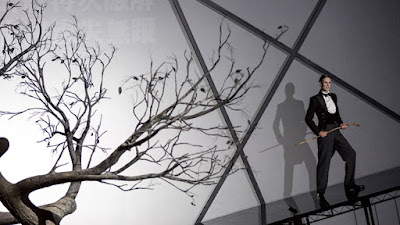Music: A Funky Take on Schubert’s Die Winterreise
The Dark Mirror: Schubert’s Die WinterreiseIan Bostridge (tenor); International Contemporary Ensemble, Baldur Brönnimann, conductor
August 12, 2017
Rose Theater, Lincoln Center NYC
Franz Schubert’s Winterreise (Winter Journey, 1828) is one of the great early romantic works, a song cycle of 24 songs for tenor/baritone and piano describing the gloomy snowy wandering of a scorned lover. He goes through the classic stages of grief, beginning in “Gute Nacht” with “I came here a stranger, As a stranger I depart”. It has always presented an eerily psychoanalytic story a full century before Freud made this sort of introspection common in the arts. Contemporary German composer Hans Zender (1936-) recomposed the piece in 1993 as a “reflection and refraction” on the original, orchestrating it for a small orchestra and pulling/tugging at the original texts and harmonies. This was presented at the NYC Mostly Mozart Festival in a staged production featuring British tenor Ian Bostridge, who has been singing this piece for over 20 years. Bostridge is a fascinating artist. He began not as a singer, but as an Oxford English scholar, writing a thesis on witchcraft and demonology. He turned to singing in his 20’s, and later achieving fame in his performances of lieder. He brings a clear timbre, crisp diction, and straightforward presence to the stage, focusing our attention on the songs. Despite his devotion to the original, he has been an enthusiastic advocate for this rewrite of Winterreise, performing it in Germany and London.
I had not heard any of Zender’s works prior to this concert. Review of his output shows an eclectic mix of electronic and conventional ensemble writing, and a predilection for works inspired by older composers, e.g. Dialog mit Haydn for two pianos and three orchestral groups (1982) and Schumann-Fantasie for large orchestra (1997). The Dark Mirror begins by orchestrating Schubert’s sublime piano accompaniments, a risky undertaking given their quality. The introversion and word-focus achieved by a singer alone with piano is often lost with orchestration. This small orchestra often sounded like a Kurt Weill-style German cabaret band, given its one-on-a-part writing for percussion, guitar, accordion, wind machine, and small string and woodwind groups. Zender’s “refraction” ranged from very conventional orchestration to intermittent added notes and measures, such as the opening when the singer’s trudging through the snow, originally portrayed by repeated chords in the piano, became an extended section of percussion swooshes and crunches—evocative but no better than Schubert’s original, I think. At times there were added twentieth century harmonies, as when the violin added seemingly random pizzicato notes over the top of the original. The effect was to merge Schubert and Berg across the span of the romantic 19th century. This 1920’s feel was enhanced by Mr. Bostridge’s attire in an old-style tuxedo, looking like Joel Grey in Cabaret. He sang from various seated and standing positions on a diagonally angled ramp midstage, with only a leafless (linden?) tree stage left. There were numerous expressionistic lighting and projected film effects, ranging from ghosts to menacing black birds (on “The Crow”) to cuts from an old film of a 20-years younger Bostridge performing the same work while walking in the snow. I liked the latter effect, as Winterreise often is about aging, and seeing the older singer lip-synching his younger self was quite effective.
Did all this add anything? While I remained interested throughout (my companion did not), and appreciated how the composer and producer showed us explicitly how Schubert foresaw the Freudian twentieth century in this poem, their “updates” and production rarely produced any emotional impact for me, and remained a curiosity rather than a compelling rethinking of the work, as any theatrical or musical revision should be. I found myself distracted and intrigued by musical, lighting, and film special effects, rather than focusing and reflecting on the music and words, as should happen in a good lieder recital. I often missed Schubert’s sublime economy of expression in the piano. Let’s call this an ambitious, but failed experiment.

Comments
Post a Comment